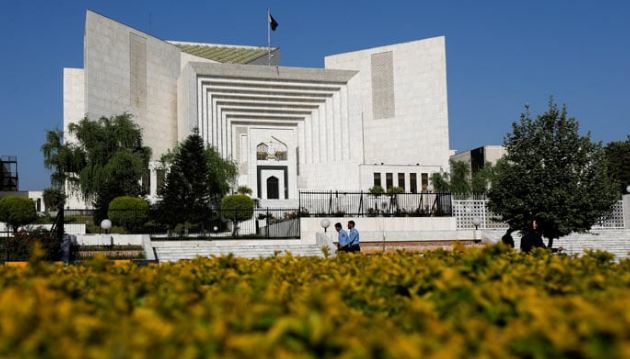ISLAMABAD: The National Assembly on Friday notified the Supreme Court (Practice and Procedure) Bill 2023 — law that would curtail the powers of the chief justice of Pakistan (CJP) — as an act.
The bill’s implementation was halted by Supreme Court’s eight-member bench headed by CJP Umar Ata Bandial.
However, it was notified as a law today because it was deemed to have been assented to by the president (with effect from April 21, 2023) under Clause (2) of Article 75 of the Constitution of the Islamic Republic of Pakistan.
The bill was approved by the federal cabinet on March 28 and then passed by both houses of parliament — the National Assembly and the Senate — only for the president to refuse to sign it into law with the observation that it travelled “beyond the competence of parliament”.
However, a joint session of parliament passed it again on April 10 with certain amendments amid a noisy protest by PTI lawmakers. It was then again referred to the president for his assent; however, he once again returned the bill without signing it.
According to the Constitution, in case the president refuses to sign the bill a second time around after the joint parliament’s approval his assent would have been deemed granted within 10 days.
On April 13, the Supreme Court barred the government from enforcing the law, saying the move would “prevent the imminent apprehended danger that is irreparable” as soon as the bill becomes an act of parliament.
“The moment that the bill receives the assent of the president or it is deemed that such assent has been given, then from that very moment onwards and till further orders, the act that comes into being shall not have, take or be given any effect nor be acted upon in any manner,” read an interim order issued by an eight-member bench.
“The court has great respect for parliament but it also has to examine if any constitutional deviation, violation or transgression has taken place while enacting the Supreme Court (Practice & Procedure) Bill, 2023,” Chief Justice of Pakistan Umar Ata Bandial, was heading the bench, had observed.
The bench comprising Justice Ijazul Ahsan, Justice Munib Akhtar, Justice Sayyed Mazahar Ali Akbar Naqvi, Justice Muhammad Ali Mazhar, Justice Ayesha Malik, Justice Syed Hasan Azhar Rizvi, and Justice Shahid Waheed observed that there appeared to be no authorisation under the Constitution that allows parliament to confer appellate jurisdiction on the court, which is now being created.
The copy of the act shared by the National Assembly Secretariat mentioned that the act shall come into force at once.
The act
The Supreme Court (Practice and Procedure) Act, 2023 aims to give the power of taking suo motu notice to a three-member committee comprising senior judges, including the chief justice. It also aims to have transparent proceedings in the apex court and includes the right to appeal.
Regarding the formation of benches, the act states that every cause, matter or appeal before the apex court would be heard and disposed of by a bench constituted by a committee comprising the CJP and the two senior-most judges. It added that the decisions of the committee would be taken by a majority.
Regarding the apex court’s original jurisdiction, the act said that any matter invoking the use of Article 184(3) would first be placed before the committee.
The act says that if the committee is of the view that a question of public importance with reference to the enforcement of any of the fundamental rights conferred by Chapter I of Part II of the Constitution is involved, it shall constitute a bench comprising not less than three judges of the SC which may also include the members of the committee, for adjudication of the matter.
On matters where the interpretation of the Constitution is required, the act said the committee would compose a bench comprising no less than five apex court judges for the task.
Regarding appeals for any verdict by an apex court bench that exercised jurisdiction under Article 184(3), the act said that the appeal would have to be filed within 30 days of the bench’s order for a larger SC bench. It added that the appeal would be fixed for hearing within a period not exceeding 14 days.
It added that this right of appeal would also extend retrospectively to those aggrieved persons against whom an order was made under Article 184(3) prior to the commencement of this act on the condition that the appeal was filed within 30 days of the act’s commencement.
The act additionally said that a party would have the right to appoint its counsel of choice for filing a review application under Article 188 of the Constitution.
Furthermore, it states that an application pleading urgency or seeking interim relief, filed in a cause, appeal or matter, shall be fixed for hearing within 14 days from the date of its filing.
The act said that its provisions would have effect notwithstanding anything contained in any other law, rules, or regulations for the time being in force or judgement of any court, including the SC and high courts.

















